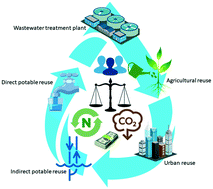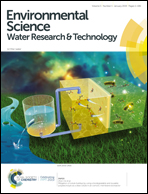A multi-criteria sustainability assessment of water reuse applications: a case study in Lakeland, Florida†
Abstract
Water shortage and water contamination necessitate adopting a reverse logistics and a closed-loop supply chain approach, which is the process of moving wastewater from its typical final destination back to the water supply chain with different levels of treatment for reuse. Hence, the incorporation of sustainability concepts through life cycle assessments for selecting reclaimed water applications considering reverse logistics and closed-loop systems is receiving more attention. However, no prior studies have evaluated the trade-off between the reclaimed water quality and corresponding costs, environmental impacts and social benefits for different types of water reuse. The aim of this study is therefore to design possible scenarios for water reuse based on water reuse guidelines and evaluate the different types of end use based on the three dimensions of sustainability (i.e., economic, environmental and social aspects) simultaneously. The different reuse types considered include unrestricted urban reuse, agricultural reuse, indirect potable reuse (IPR), direct potable reuse (DPR), distributed unrestricted urban reuse, as well as some degree of decentralization of treatment plants for distributed unrestricted urban reuse. The trade-off investigation and decision-making framework are demonstrated in a case study and a regret-based model is adopted as the support tool for multi-criteria decision-making. This study revealed that although increasing the degree of treatment for water reuse increases the implementation and operation and maintenance (O&M) costs of the design, it increases the value of resource recovery significantly, such that it can offset the capital and O&M costs associated with the treatment and distribution for DPR. Improving the reclaimed water quality also reduces the environmental footprint (eutrophication) to almost 50% for DPR compared to the other reuse scenarios. This study revealed that the distance between the water reclamation facility and the end use plays a significant role in economic and environmental (carbon footprint) indicators.



 Please wait while we load your content...
Please wait while we load your content...